The tiny kingdom of Bhutan, the last-remaining independent Buddhist nation in the Himalayas, has crowned its new monarch.
Jigme Khesar Namgyal Wangchuck, who was educated at Britain's Oxford University, was finally crowned king after a two-and-a-half year wait for the moment when Bhutanese astrologers said would be ideal for the coronation.
Wangchuk will, in effect, be the country's first Constitutional Monarch. All the previous monarchs of the kingdom were Absolute Monarchs, meaning Bhutan was the last-remaining Absolutely Monarchy on Earth until now.
Under the new reforms the king remains the head of state and will continue to have extensive powers, but Parliament can impeach him with a two-thirds majority.
Like Britain's coronation of a new monarch (but unlike the comparatively mundane and ordinary heralding in of a new president in most republics) the coronation was a beautiful and colourful ceremony, during which the Raven Crown was placed on Wangchuk's head, giving him the title "Dragon King".
Bhutan gained its independence from India in 1949 which, in turn, gained its independence from Britain in 1947.
Pictured: Oxford-educated Dragon King of Bhutan crowned in front of adoring thousands
By Daily Mail Reporter
06th November 2008
Daily Mail
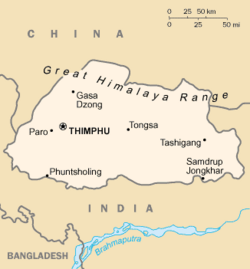
A Bhutan, a tiny nation with a population of just 673,000, is sandwiched between the giants of India and China
The tiny Himalayan nation of Bhutan celebrated in an explosion of colour as it crowned its new king today.
Jigme Khesar Namgyal Wangchuck, who was educated at Oxford, was finally crowned king after a two-year wait for the precise moment deemed most auspicious by astrologers for a successful reign.
At exactly 8:31 am, former King Jigme Singye Wangchuck, 52, placed the Raven Crown on the head of his 28-year-old son son, giving him the title of Druk Gyalpo, or Dragon King.
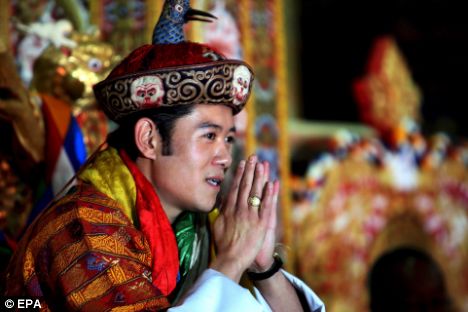
Bhutan's new king Jigme Khesar Namgyel Wangchuck prays for a successful reign at his coronation today
The elder Wangchuck, who was crowned in 1974, announced two years ago he was abdicating in favour of his son as part of new democratic reforms.
Under the new reforms the king remains the head of state and will continue to have extensive powers, but Parliament can impeach him with a two-thirds majority.
The ceremony was seen as deeply reassuring for the last independent Himalayan Buddhist kingdom - once one of the most cut off and tightly controlled places on earth.
The bachelor, who is the world's youngest monarch, promised to put Gross National Happiness before Gross National Product.
Tens of thousands of people came from all over the country for the coronation, including nomadic yak herders who trekked for days from the icy Himalayan mountains of northern Bhutan and members of the Hindu minority who came from the subtropical south.
Conducted in the Tashichho Dzong, a massive 17th century white-walled fortress that serves both as administrative headquarters and a monastic centre, the ceremony was an elaborate display of pageantry mingled with sacred Buddhist rituals.
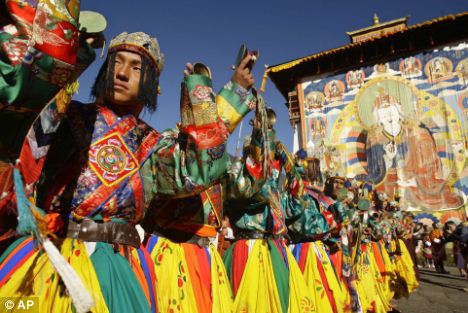
Traditionally dressed Bhutanese dancers perform during the coronation ceremony
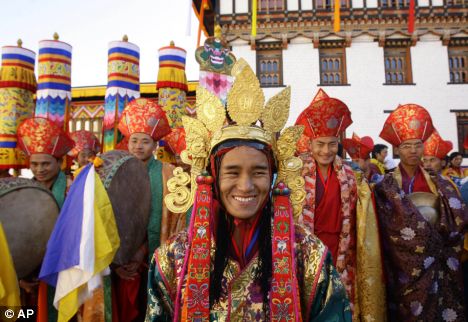
The king's coronation was a spectacular and colourful event
After being greeted by troupes of brightly clad dancers the royal family, heads of government and the chief abbot went up to the throne room where the new king received his satin and silk crown.
He then walked through a guard of honour, past three four-story-high banners depicting the lives of Buddha and the gurus who brought the faith to Bhutan, to a temple on the other side of the fortress.
Led by the Je Khenbo, head of the Bhutanese Buddhists, dignitaries placed offerings of fruit, wine and food before the king and eight objects symbolising the virtues a good king should have.
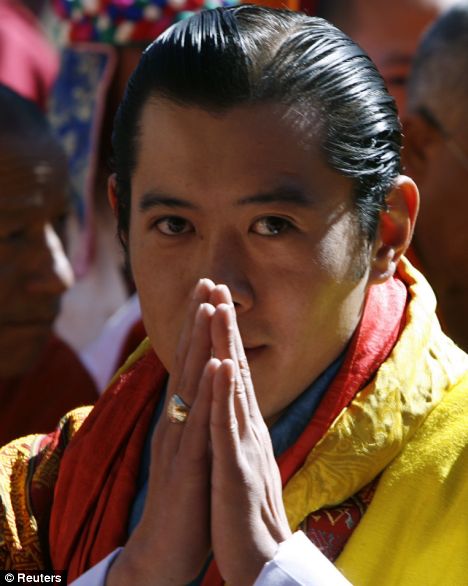
The new king greets the crowd following his coronation
Later in the day he was to re-enact much of the ceremony in front of thousands of citizens who gathered at a large amphitheatre next to the fortress.
The monarchy has been at the heart of Bhutan's idiosyncratic recent history, at times imposing strict laws to maintain traditional medieval ways of life and at others prodding a reluctant nation toward change.
Most Bhutanese believe it is the kings who have allowed the small nation of some 700,000 people to survive with their culture and sovereignty intact while sandwiched between 1.1 billion Indians to the south and 1.3 billion Chinese to the north.
These two Asian giants have already swallowed the other Buddhist kingdoms, like Sikkim or Tibet, that once thrived across the Himalayan range.
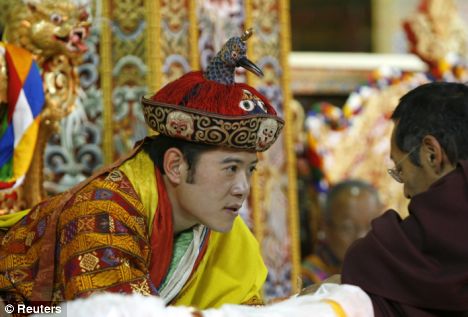
The new king receives greetings and blessings from people in the throne room during his coronation ceremony inside Tashichhodzong Palace
'We have enjoyed progress, sustained peace, security and growth. These are all attributed to the great kings, benevolent kings, selfless kings that Bhutan has had,' Prime Minister Jigme Thinley, who was elected in the country's first democratic elections in March said.
The kings first decided to begin opening the country to the outside world in the 1960s, embarking on a program of deliberately slow-paced reforms.
At that time Bhutan was a medieval society with no paved roads, no electricity and no hospitals.
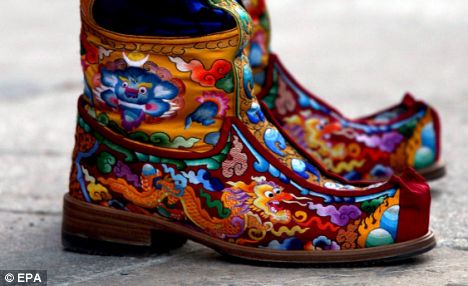
The king has some big, colourful and traditional shoes to fill
It was only at the coronation of the last king in 1974 that foreign dignitaries and the media were allowed into Bhutan for the first time.
Foreigners are still restricted, with only 20,000 tourists allowed in each year on heavily supervised, expensive trips. Television and the Internet were first allowed in 1999.
Bhutan has taken severe steps to preserve its culture and has driven out more than 100,000 Hindus in the early 1990s.
Most now live in refugee camps in Nepal, and Bhutan refuses to take them back.
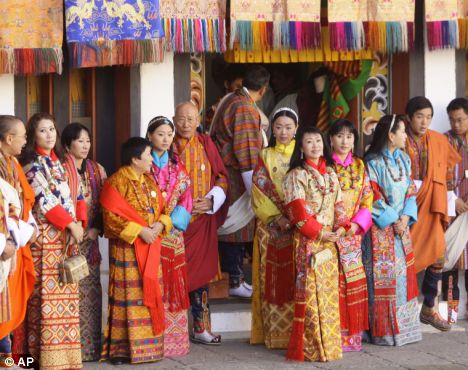
Members of the royal family await the commencement of the coronation ceremony
dailymail.co.uk
Jigme Khesar Namgyal Wangchuck, who was educated at Britain's Oxford University, was finally crowned king after a two-and-a-half year wait for the moment when Bhutanese astrologers said would be ideal for the coronation.
Wangchuk will, in effect, be the country's first Constitutional Monarch. All the previous monarchs of the kingdom were Absolute Monarchs, meaning Bhutan was the last-remaining Absolutely Monarchy on Earth until now.
Under the new reforms the king remains the head of state and will continue to have extensive powers, but Parliament can impeach him with a two-thirds majority.
Like Britain's coronation of a new monarch (but unlike the comparatively mundane and ordinary heralding in of a new president in most republics) the coronation was a beautiful and colourful ceremony, during which the Raven Crown was placed on Wangchuk's head, giving him the title "Dragon King".
Bhutan gained its independence from India in 1949 which, in turn, gained its independence from Britain in 1947.
Pictured: Oxford-educated Dragon King of Bhutan crowned in front of adoring thousands
By Daily Mail Reporter
06th November 2008
Daily Mail

A Bhutan, a tiny nation with a population of just 673,000, is sandwiched between the giants of India and China
The tiny Himalayan nation of Bhutan celebrated in an explosion of colour as it crowned its new king today.
Jigme Khesar Namgyal Wangchuck, who was educated at Oxford, was finally crowned king after a two-year wait for the precise moment deemed most auspicious by astrologers for a successful reign.
At exactly 8:31 am, former King Jigme Singye Wangchuck, 52, placed the Raven Crown on the head of his 28-year-old son son, giving him the title of Druk Gyalpo, or Dragon King.

Bhutan's new king Jigme Khesar Namgyel Wangchuck prays for a successful reign at his coronation today
The elder Wangchuck, who was crowned in 1974, announced two years ago he was abdicating in favour of his son as part of new democratic reforms.
Under the new reforms the king remains the head of state and will continue to have extensive powers, but Parliament can impeach him with a two-thirds majority.
The ceremony was seen as deeply reassuring for the last independent Himalayan Buddhist kingdom - once one of the most cut off and tightly controlled places on earth.
The bachelor, who is the world's youngest monarch, promised to put Gross National Happiness before Gross National Product.
Tens of thousands of people came from all over the country for the coronation, including nomadic yak herders who trekked for days from the icy Himalayan mountains of northern Bhutan and members of the Hindu minority who came from the subtropical south.
Conducted in the Tashichho Dzong, a massive 17th century white-walled fortress that serves both as administrative headquarters and a monastic centre, the ceremony was an elaborate display of pageantry mingled with sacred Buddhist rituals.

Traditionally dressed Bhutanese dancers perform during the coronation ceremony

The king's coronation was a spectacular and colourful event
After being greeted by troupes of brightly clad dancers the royal family, heads of government and the chief abbot went up to the throne room where the new king received his satin and silk crown.
He then walked through a guard of honour, past three four-story-high banners depicting the lives of Buddha and the gurus who brought the faith to Bhutan, to a temple on the other side of the fortress.
Led by the Je Khenbo, head of the Bhutanese Buddhists, dignitaries placed offerings of fruit, wine and food before the king and eight objects symbolising the virtues a good king should have.

The new king greets the crowd following his coronation
Later in the day he was to re-enact much of the ceremony in front of thousands of citizens who gathered at a large amphitheatre next to the fortress.
The monarchy has been at the heart of Bhutan's idiosyncratic recent history, at times imposing strict laws to maintain traditional medieval ways of life and at others prodding a reluctant nation toward change.
Most Bhutanese believe it is the kings who have allowed the small nation of some 700,000 people to survive with their culture and sovereignty intact while sandwiched between 1.1 billion Indians to the south and 1.3 billion Chinese to the north.
These two Asian giants have already swallowed the other Buddhist kingdoms, like Sikkim or Tibet, that once thrived across the Himalayan range.

The new king receives greetings and blessings from people in the throne room during his coronation ceremony inside Tashichhodzong Palace
'We have enjoyed progress, sustained peace, security and growth. These are all attributed to the great kings, benevolent kings, selfless kings that Bhutan has had,' Prime Minister Jigme Thinley, who was elected in the country's first democratic elections in March said.
The kings first decided to begin opening the country to the outside world in the 1960s, embarking on a program of deliberately slow-paced reforms.
At that time Bhutan was a medieval society with no paved roads, no electricity and no hospitals.

The king has some big, colourful and traditional shoes to fill
It was only at the coronation of the last king in 1974 that foreign dignitaries and the media were allowed into Bhutan for the first time.
Foreigners are still restricted, with only 20,000 tourists allowed in each year on heavily supervised, expensive trips. Television and the Internet were first allowed in 1999.
Bhutan has taken severe steps to preserve its culture and has driven out more than 100,000 Hindus in the early 1990s.
Most now live in refugee camps in Nepal, and Bhutan refuses to take them back.

Members of the royal family await the commencement of the coronation ceremony
dailymail.co.uk